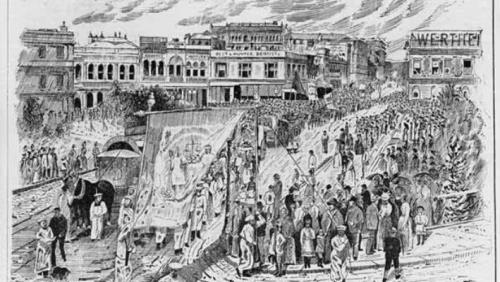Why we need to keep celebrating historic labour rights struggle
6 November 2019

First official Labour Day in 1890
Accounting firm EY has given permission to the workers to swap their Labour Day public holiday for a different day off is significant, the Dominion Post reported.
It points to how much we are changing as a society.
They said they made the change to recognise that there were multiple holy days in different religions and workers should be able to celebrate the days that were most important to them.
The change doesn't only apply only for Labour Day, in fact workers can elect to switch up to two days of public holidays for culturally significant dates, we are told.
A determined young Londoner, Samuel Parnell, helped create Labour Day. He landed at Petone Beach on 8 February 1840 with his new wife.
He travelled with a shipping agent who asked him to build a store at Petone. He said he would do his best but there was one condition: he would only work 8 hours, not the 10 hours that were standard in London.
He famously explained that a day had 24 hours, eight for work, eight for sleep and eight for recreation, for which people might do whatever they liked for themselves.
He said he was ready to start in the morning at 8 o'clock but those were his terms and there would be no negotiation.
Parnell got his way. Other employers in the Wellington area tried to impose longer hours but Parnell campaigned for the eight hour day and in October 1840 a meeting of Wellington workmen resolved to work eight hours a day from 8 am to 5 pm and that "anybody offending would be ducked into the harbour".
So, Parnell spread his little victory and enlisted the support of others.
With the passage of 50 years in 1890, an emerging trade union movement reminded itself of its origins. Citizens in Wellington formed a committee to honour him and initiated the first annual Labour Day demonstration on 28 October 1890.
Parnell was seated on a brake drawn by four horses and headed the march to Newtown Park where he was heralded for the eight hours movement.
Newtown Park was frequently the venue for the celebration of Labour Day with union bands leading the way through Wellington to the celebration at Newtown Park.
Sports events took place and displays were made by the Union guilds of the day, along with other unions which were gathering their strength. In 1899 the Liberal Government under Seddon established a public holiday in October which from 1910 was set as the fourth Monday in October.
Initially the holiday was celebrated by parades across the country attended by huge crowds and elaborate floats.
Picnics and sports competitions involving union families were also held. The Dominion in 1914 reported that the great majority of citizens will turn out to witness the big procession proceeding from Lambton Quay to Newtown Park where a sports gathering and festivities were held, including Highland dancing, a baby show and a tug of war.
Later that evening, vocal and picture entertainment was held in the Town Hall.
Unions play a significant role in society, particularly in support of their members. However, their numbers, influence and visibility have faded from the heyday of union strength and power. With that fading influence, the struggle of people to create the eight hour day and its historic significance is easily forgotten.
Holidays linked to elements of our history do lose their significance with the passage of time.
While once large crowds would have turned out for a visit from the Royal Family, today such visits have little impact on most people. Hence the growing call for Queen's Birthday to be abolished as a holiday and be replaced by a public holiday to celebrate Matariki - the Maori New Year.
EY's public announcement of their invitation to staff to transfer two holidays which was published around Labour Day, is a symbolic reminder of our changing history.
Celebrations that were once extremely relevant to most people in New Zealand have become diluted to just another holiday for reasons which make no strong impact on most of the population.
No harm is served by remembering our history and also how much we have changed.


